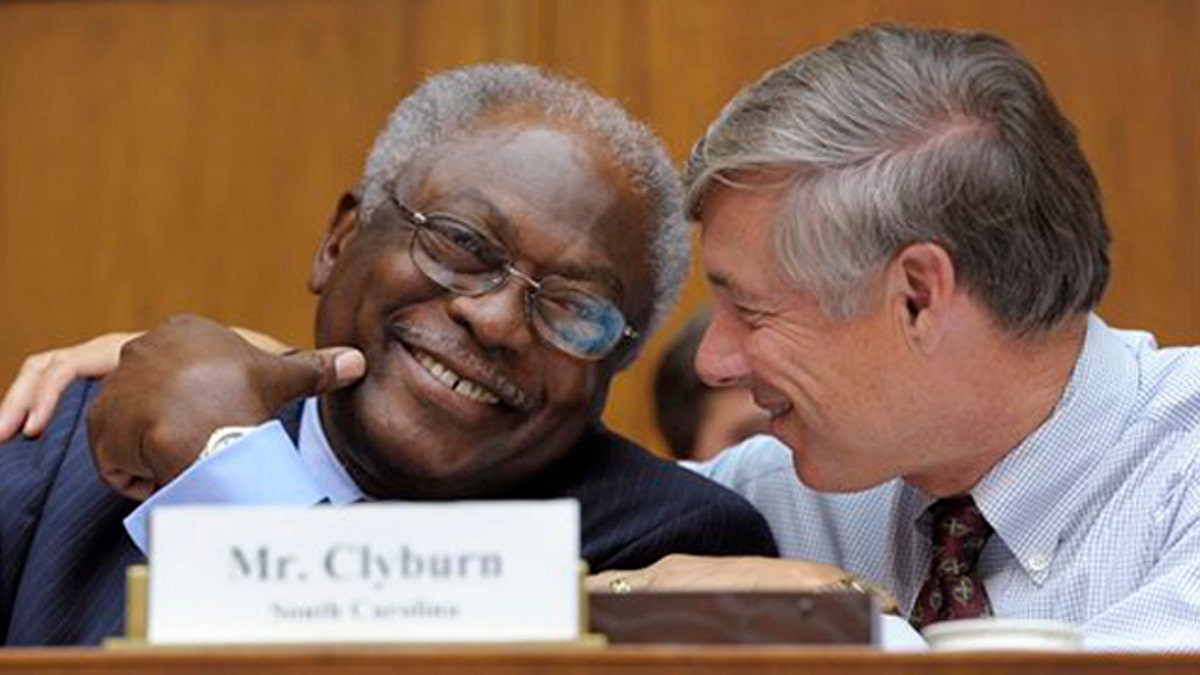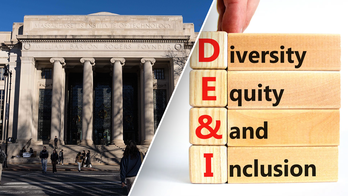
Rep. James Clyburn, left, shares a laugh with Rep. Fred Upton, right, before the start of the Joint Select Committee on Deficit Reduction meeting in Washington Sept. 8. (AP)
WASHINGTON – Members of the bipartisan "super committee" tasked with closing the deficit said Thursday that their mission must focus on job creation as well as debt reduction, reflecting increased anxiety about the state of the economy at their opening session.
In contrast to the bruising debt-ceiling debate from which the committee was spawned, the first meeting was conducted with a conciliatory tone. Democrats and Republicans alike voiced optimism about their ability to find common ground and stressed the need to use the panel as a vehicle to create jobs.
The dual goals could be difficult to achieve. Though more jobs would mean more tax revenue, the stimulus-style measures out of Washington during and after the recession have so far inflamed the deficit.
Lawmakers did not detail how they might tackle the two challenges at once but claimed the solutions need not be mutually exclusive.
"These are not competing goals," Rep. Chris Van Hollen, D-Md., said. "They overlap. Every day that the economy is stalled is another day that the American people are hurting and another day that the deficit is growing."
Sen. John Kerry, D-Mass., said the country's got a "jobs deficit" which must be corrected in order to fix the budget -- which this year carries a deficit of $1.3 trillion.
Rep. Fred Upton, R-Mich., likewise said the committee must view its role through the lens of job creation and fiscal responsibility.
Republican Sen. Jon Kyl, R-Ariz., echoed that point.
"There is a strong connection ... between our challenge of reducing the deficit and the necessity of job creation," he said. However, shortly afterward at a separate event, Kyl said that he made clear to GOP leaders that he would not serve on the committee if it considers defense cuts beyond those already extracted in the recent debt-ceiling debate.
The remark was a reminder that lawmakers on the committee all have interests that they want to protect in the course of debate.
The panel is charged with finding, by Thanksgiving, $1.5 trillion in savings over the next decade, no easy task despite the upbeat assessments Thursday.
Democrats want to produce a mix of spending cuts and revenue increases. Republicans have insisted they would oppose tax increases, though some have indicated they might accept the closing of some tax loopholes tied to other tax reforms.
Democratic aides to the House Ways and Means Committee have produced documents listing possible options for revenue increases and savings from health care programs, including many that were discussed in previous deficit-reduction talks.
The options, which a Ways and Means spokesman said have not been discussed by lawmakers, include various tax increases on the wealthy, oil companies and businesses that transfer some assets overseas, and savings from Medicare, including trimming reimbursements to health care providers and gradually raising the program's eligibility age to 67 -- which the documents call "a radical departure from current policy."
Lawmakers in both parties said they felt good about the opening session.
"We understand the weight on our shoulders to come together in a strong, bipartisan proposal," Sen. Patty Murray, D-Wash., said. "I'm very pleased with our progress and ready to get to work."
The committee was reminded of the pressure to address the economic situation Thursday as protesters chanted "What do we want? Jobs. When do we need them? Now," outside the meeting room. The protesters eventually left and were not arrested.
None of the Democrats on the committee specified what job creation program they might favor.
Part of that answer might come Thursday evening when Obama delivers an address on jobs to a joint session of Congress. He is expected to propose extending a reduction in the payroll tax that will otherwise expire, giving tax incentives to companies that hire the jobless and boosting spending on public works.
Republicans would be likely to oppose adding spending to the committee's debt-reduction effort.
House Ways and Means Committee Chairman Dave Camp, R-Mich., a super committee member, said debt reduction would create jobs because reducing the federal debt would help the economy grow.
"Overspending has really spooked the markets and made it more difficult for employers to have confidence to invest and hire people and create jobs," Camp said in an interview.
Under the debt ceiling agreement, which narrowly averted a potential federal default, Congress must approve at least $1.2 trillion in savings by Christmas. If it doesn't, the difference would be made up by automatic spending cuts, divided evenly among defense and many domestic programs.
Behind the scenes, the super committee's work has already begun. Republicans and Democrats each held closed-door, daylong strategy sessions on Wednesday. House Speaker John Boehner attended part of the GOP meeting, highlighting the importance of the panel's work.
A second public meeting of the committee is set for next Tuesday, when the head of the nonpartisan Congressional Budget Office, Douglas Elmendorf, will explain how the government's debt got so huge.
The panel has six members each from the House and Senate, evenly divided by party.
The Associated Press contributed to this report.




